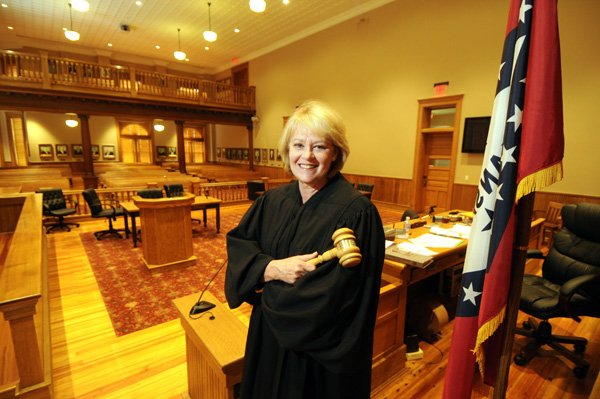FAYETTEVILLE — Departing Circuit Judge Mary Ann Gunn remains quiet on details of a television show she apparently will star in this fall, but if it becomes a reality, state Department of Community Corrections probation officers won’t be part of the show.
Officials with the state confirmed Wednesday they withdrew permission for officers to work on the drug court show being promoted by a Los Angeles television production company. Gunn will retire June 11. She has declined to provide any specifics about her plans or the TV show, being marketed as “Last Shot with Judge Gunn.”
Gunn was not in her office Wednesday and did not return phone calls. She did reply to a text message.
“I don’t think it is proper to comment as I am still a sitting judge,” Gunn said.
Internal Department of Community Corrections email from last month show the department’s management cleared officers to work Saturday afternoons, essentially playing themselves for Gunn’s show, for four-hour shifts at $25 per hour. The documents were obtained through a Freedom of Information Act request.
But Wednesday, after calls from reporters asking about the decision, managers reversed the decision and barred officers from participating.
“If offenders see a DCC officer in court and that person as an actor portraying an officer, it has the potential for confusion,” spokeswoman Rhonda Sharp said Wednesday.
In a May 11 email to four probation officers — Daniel Clement, Deidre Uselton, Michael McHenry and Tabatha Oswald — Ricky Hogg, assistant area manager for the department’s Area 1, which includes Northwest Arkansas, directs all four to “keep everything to yourselves” about the show.
“If anyone asks you about it just say it is being worked on and nothing is for sure yet,” Hogg wrote.
In another email between Morris and his bosses, Dan Roberts, the Community Correction deputy director for probation and parole services and Jeff Tillman, the assistant director for probation and parole services, Morris received clearance for officers participating in the project to discuss the personal histories of offenders, such as criminal convictions and drug test results on camera.
Officers were also cleared to be taped doing their job on camera, such as making home visits to those going through the drug court program.
However, they could not be ordered to do anything by Gunn.
Morris wrote Gunn’s drug treatment program will be licensed by the state. For a judge to order someone to a drug treatment program, it must be licensed through the Office of Alcohol and Drug Abuse Prevention, a process that takes about six months.
Gunn and the production company have released few details about how the show will work or interact with Arkansas’ judicial system. Sharp said it was her understanding the program will focus on treatment for drug offenders, who can receive treatment through the effort even if they do not wish to appear on camera.
In a May 26 email, Hogg, wrote to area manager Vince Morris that cases would be referred to Gunn’s program by Judge J. Michael Fitzhugh, drug court judge of Sebastian County, and Circuit Judge William Storey, a circuit judge in Washington County who also serves as administrative judge for the 4th Judicial District. The district includes Washington and Madison counties.
“That’s not accurate,” was the extent of Storey’s response Wednesday. He declined to comment further.
Fitzhugh, who was presiding over a trial Wednesday, did not return calls.
John Threet, Washington County prosecuting attorney, said neither he nor his office are involved in a drug court television show.
During her 11 years in office, Gunn’s became the face of Washington-Madison County Drug Court, aimed at keeping nonviolent, first-time offenders out of the traditional court system. The program works to get defendants treatment through an intensive, nine-month counseling and supervision program.
She allowed drug court to be televised on public access channels starting in 2004, and looked to take the show national last year. Broadcasts ceased after the Arkansas Supreme Court Judicial Ethics Advisory Committee issued an opinion questioning whether televising the hearings unnecessarily increases notoriety of the defendants and advances Gunn’s personal interests.
Gunn, who has in recent weeks incorporated a limited liability company known as Gunn Enterprises.

